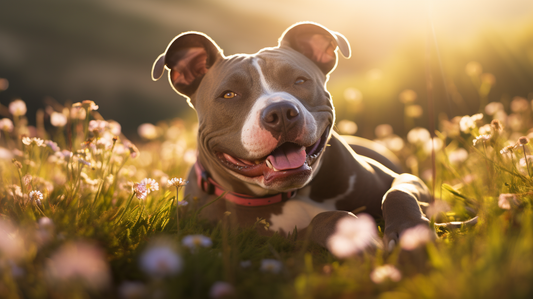The Truth About Pit Bull Terriers: Myths and Facts
Tom Drachman- Pittie Choy
- Pit bulls Advocacy & Education
- The Truth About Pit Bull Terriers: Myths and Facts

Table of Contents
American Pit Bull Terriers, or pit bulls, have long been one of the most controversial dog breeds in the world. Misinformation and negative stereotypes surrounding these dogs have led to misconceptions and fear among the general public. It is important to know the truth about pit bulls and dispel the myths that have been perpetuated for so long.
At Pittie Choy, we believe in promoting positive attitudes and respect for all breeds, including pit bulls. In this article, we aim to provide accurate information about pit bulls and clear up some common misconceptions. We hope to educate and inform our readers, and ultimately change the way people view these amazing dogs.
Myth 1: Pit bulls are inherently aggressive
Pit bulls have a reputation for being aggressive and dangerous dogs, but this perception is largely unfounded. One of the most pervasive myths about pit bulls is that they are inherently aggressive. This myth stems from the fact that pit bulls were originally bred for dogfighting, a brutal and illegal activity that requires dogs to be aggressive towards other dogs.
However, it is important to note that pit bulls are not inherently aggressive. In fact, many pit bulls are gentle, friendly, and affectionate dogs that make wonderful family pets. According to the American Temperament Test Society, which tests the temperament of various dog breeds, pit bulls score above average or average for temperament, and are just as friendly and gentle as other popular dog breeds like Golden Retrievers and Labrador Retrievers.
The myth that pit bulls are inherently aggressive is perpetuated by sensationalized media reports of pit bull attacks. While it is true that pit bulls are responsible for a disproportionate number of dog bite incidents, this is largely due to the fact that they are one of the most commonly owned breeds in the United States.
It is also important to recognize that aggression in dogs is not breed-specific, and that any dog, regardless of breed, can become aggressive if they are not properly socialized, trained, and cared for. In fact, many experts argue that the real problem lies not with the breed itself, but with irresponsible owners who fail to properly care for their dogs.
In conclusion, the idea that pit bulls are inherently aggressive is a myth that has been perpetuated by sensationalized media reports and a lack of understanding about dog behavior. While it is true that pit bulls were originally bred for dogfighting, this does not mean that they are inherently aggressive. With proper socialization, training, and care, pit bulls can be loving, gentle, and loyal pets.
Myth 2: Pit bulls have locking jaws
This is another popular myth that surrounds the American Pit Bull Terrier breed. The myth claims that pit bulls have locking jaws that cannot be opened once they bite down on something. This myth is often used to add to the breed's aggressive reputation, making them seem even more dangerous than they already are perceived to be.
Where does this myth come from?
The belief in pit bulls having locking jaws can be traced back to the 19th century when the breed was used for bull-baiting and dogfighting. During these illegal blood sports, pit bulls were known for their ability to grab onto their opponents and not let go. This was due to their strong jaws and determined nature, not because their jaws could lock.
Scientific evidence to disprove the myth
There is no scientific evidence to suggest that pit bulls have locking jaws. In fact, pit bulls' jaw structure is similar to that of other breeds of dogs. Their jaws are made up of bone, muscle, and tendons, just like any other dog's jaw. Furthermore, a pit bull's jaw is not physically capable of locking into place.
Additionally, studies have shown that a pit bull's bite force is not significantly higher than that of other breeds. In fact, other breeds such as Rottweilers, German Shepherds, and Mastiffs have a stronger bite force than pit bulls.
Conclusion:
The myth that pit bulls have locking jaws is just that - a myth. It is not supported by scientific evidence, and there is no basis for the belief that pit bulls have a unique jaw structure that allows them to lock their jaws. It is important to separate fact from fiction when it comes to pit bulls, and to not perpetuate false information that only serves to demonize the breed.
Myth 3: Pit bulls cannot be trusted around children
This myth has caused a great deal of harm to both pit bulls and families who could benefit from having a loving and loyal pit bull in their home. The myth that pit bulls are inherently dangerous around children is not only false but also harmful. This myth has resulted in many families being unable to adopt or keep pit bulls, even when they would be great family pets.
The truth is that pit bulls can make excellent family pets and are often great with children. Like any dog breed, it is important to socialize and train pit bulls from a young age to ensure they are well-behaved and know how to interact with people of all ages.
Many pit bull owners have shared heartwarming stories of their dogs being gentle and loving with children. In fact, pit bulls were once known as "nanny dogs" because of their loyalty and affection towards children. There are countless examples of pit bulls acting as protectors and friends to children in their families.
It is important to remember that no dog breed is inherently dangerous, and it is unfair to stereotype an entire breed based on a few bad experiences. With proper socialization, training, and responsible ownership, pit bulls can make wonderful family pets and lifelong companions.
Myth 4: Pit bulls are illegal to own
One of the most persistent myths surrounding pit bulls is that they are illegal to own. In fact, this is not true. While there are some cities and towns that have breed-specific legislation (BSL) targeting pit bulls, the majority of places do not ban the breed outright.
BSL is a type of law that regulates or bans certain breeds of dogs based on their appearance rather than their behavior. These laws often target pit bulls, as well as other breeds such as Rottweilers, German Shepherds, and Doberman Pinschers.
The problem with BSL is that it is based on stereotypes and misconceptions about certain breeds of dogs. It assumes that all pit bulls are dangerous and aggressive, which is simply not true. In fact, many pit bulls are loving, loyal, and well-behaved pets.
BSL is also ineffective at reducing dog bites and attacks. Studies have shown that BSL does not actually make communities safer, and that it can actually increase the number of dog bites in some cases.
In addition, BSL is often expensive to enforce and can place a burden on taxpayers. The costs associated with enforcing BSL can include increased animal control staffing, court costs, and the cost of impounding and euthanizing dogs that are deemed to be in violation of the law.
Overall, BSL is a misguided and harmful approach to addressing the issue of dog bites and attacks. Rather than targeting specific breeds of dogs, we should focus on educating the public about responsible dog ownership and promoting positive training methods. By doing so, we can create safer communities for both people and pets.
Fact 1: Pit bulls are not a breed, but a type of dog
Despite the widespread use of the term “pit bull”, there is actually no single breed that is officially recognized as a pit bull. The term is generally used to refer to several breeds that are similar in appearance and temperament, including the American Pit Bull Terrier, Staffordshire Bull Terrier, American Staffordshire Terrier, and the Bull Terrier.
These breeds were originally developed for blood sports such as bull-baiting and bear-baiting, but over time they were bred to be companion animals and to work on farms. They are known for their loyalty, intelligence, and affectionate nature, and many pit bulls are used as therapy dogs, service animals, and search and rescue dogs.
It is important to note that while these breeds may share physical characteristics, each individual dog has its own unique personality and temperament. It is unfair and inaccurate to label all pit bulls as aggressive or dangerous based on their breed alone. In fact, many pit bulls are gentle and loving family pets who bring joy to their owners and communities.
Fact 2: Pit bulls can make great family pets
Despite their negative reputation, pit bulls have many qualities that make them great family pets.
Here are some traits that are often found in pit bulls:
- Loyal: Pit bulls are known for their loyalty and devotion to their families. They will protect their loved ones and are often described as “velcro dogs” because they like to stick close to their people.
- Playful: Pit bulls are energetic dogs who love to play. They are often referred to as “clowns” for their goofy and playful nature.
- Affectionate: Pit bulls are also known for their affectionate personalities. They love to cuddle and show their love through physical affection.
- Smart: Pit bulls are intelligent dogs who are eager to please. They respond well to training and enjoy learning new things.
Responsible ownership is key to having a happy and healthy pit bull.
Here are some tips for responsible pit bull ownership:
- Socialization: Socializing your pit bull with people and other animals from a young age is important. This can help prevent aggression and fearfulness.
- Training: Training is essential for all dogs, but especially for pit bulls. Positive reinforcement training methods can help your pit bull learn good manners and behavior.
- Exercise: Pit bulls are energetic dogs who require daily exercise. This can include walks, runs, and playtime.
- Health care: Regular veterinary care, including vaccinations and checkups, is important for your pit bull's health.
By being a responsible owner, you can help break the negative stereotypes surrounding pit bulls and show others the true nature of these wonderful dogs.
In conclusion, the myths and facts surrounding pit bulls have been widely debated and discussed for years. However, it is important to understand the truth about these dogs and to dispel the harmful myths that have been perpetuated.
Pit bulls are not inherently aggressive, they do not have locking jaws, and they can make wonderful family pets. It is crucial to know the truth about these dogs and to promote responsible ownership practices.
As members of the Pittie Choy community, it is our responsibility to spread awareness and educate others about the truth of pit bulls. By sharing our positive experiences and the facts surrounding these dogs, we can help to combat the negative stigma that has been attached to them for far too long.
Let us all work together to advocate for pit bulls and promote their positive qualities, rather than perpetuating harmful myths. Together, we can make a difference and help to give pit bulls the loving homes they deserve.






